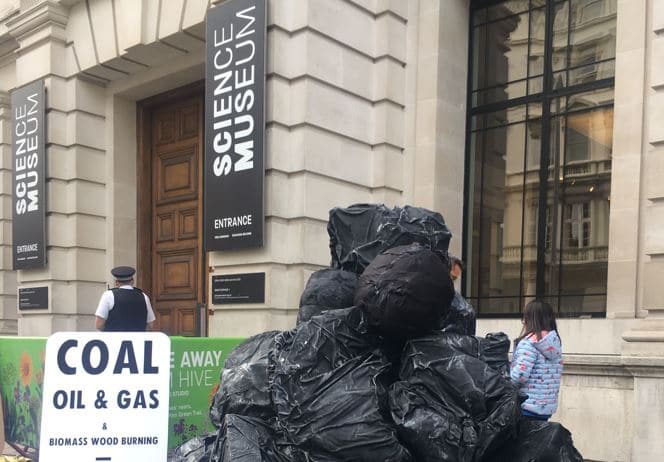Bank bosses due to attend a green investment summit tomorrow head institutions which have provided over £700 billion of financing for the fossil fuel industry since the 2015 Paris Agreement, including £129 billion in 2020 alone.
Campaigners have criticised the expected presence of the “world’s biggest financiers” of fossil fuels at the UK government event, which drew protests by Extinction Rebellion and Biofuelwatch activists on Sunday.
The global investment summit is being held at the Science Museum in London and at Windsor Castle to “galvanise foreign investment in the UK’s green industries of the future” ahead of the United Nations COP26 climate summit in Glasgow in November, according to the Department for International Trade.
Senior executives at Citi, JPMorgan, Barclays, Goldman Sachs, NatWest and Lloyds Banking Group are among over 200 investors expected to attend. Banks are increasingly committing to long-term targets of reaching net zero emissions by 2050, but have been criticised for failing to make more concrete cuts by 2030.
Analysis of data from campaign group BankTrack finds that eight of the banks represented at the summit have continued to finance highly polluting coal, oil and gas through commercial and investment banking in the five years since the Paris Agreement was reached to pursue efforts to limit global warming to 1.5C.
“Inviting these banks to a Green Investment Summit is like having Marlboro at a cancer summit,” Adam McGibbon, UK campaign lead at Market Forces, told DeSmog.
“Banks like Barclays, JPMorgan and Goldman Sachs are out of excuses. The bare minimum that a bank should commit to now is to no longer finance the expansion of the fossil fuel industry, and these banks won’t even commit to that.”
‘Concrete Commitments Needed’
DeSmog’s analysis of BankTrack data revealed the eight banks financed a total of £703.2 billion in coal, oil and gas between 2016-2020.
JPMorgan financed £230 billion in fossil fuels between 2016 and 2020. Citi funded £172 billion of fossil fuels in the same period, while Barclays financed £105 billion. JPMorgan and Barclays CEOs Jamie Dimon and Jes Staley are attending the summit, as is Citi’s head of Europe, David Livingstone.
Morgan Stanley financed £80 billion in fossil fuels since the Paris Agreement, Goldman Sachs £73 billion, and Santander £24.8 billion, the data suggested. Morgan Stanley’s European lead Clare Woodman is attending the summit, along with Goldman Sachs chief executive David Solomon and Santander chair Ana Botín.
Natwest, whose chief executive Alison Rose is due to attend, has financed £9.7 billion in fossil fuels since the Paris Agreement, including £284 million in coal mining, while Lloyds Bank – represented at the summit by chief executive Charlie Nunn – has financed £8.7 billion in fossil fuels since the international climate treaty, including £1.7 billion in 2020.
Analysis of the BankTrack data reveals that in 2020 alone, the eight banks funded £129 billion in fossil fuels, including £37 billion from JP Morgan, £35 billion from Citi, and £20 billion from Barclays.
The amounts include high levels of funding in coal, the most polluting fossil fuel. In 2020 the banks supported the coal industry to the tune of £2.8 billion, with billions worth of financing both in coal power and in coal mining.
The findings come after a DeSmog investigation found that the majority of directors at the world’s biggest banks had affiliations to polluting companies and organisations, at a time when the international financial sector is under increasing pressure to stop funding fossil fuels.
Maaike Beenes, coordinator of BankTrack’s bank, climate and energy team, said: “The banks and investors being invited to this summit are among the world’s biggest financiers of the fossil fuel industry.
“Most of them are even financing companies and projects that expand fossil fuels, like the Cambo Oil Field in the North Sea.
“For COP26 we need to see banks come with concrete commitments to immediately stop financing new fossil fuel projects and the companies planning them. Promises that fall short of this or delay action until 2030 and 2050 are just window-dressing.”
‘Proud to Take Part’
A spokesperson for the Department for International Trade said: “The UK’s climate change and environment policies are some of the most ambitious in the world. We are the first major economy to pass new laws for net zero emissions by 2050.
“Our Global Investment Summit will show how we can invest in new technologies to create a more prosperous, green future and we must engage with partners from different sectors in order to make this transition.”
A spokesperson for NatWest Group said the company was “proud” to be taking part in the green investment summit. The group was “determined” to play a major role in the transition to a zero carbon economy, the spokesperson said, referring to its recent pledge to create a £100 billion climate and sustainable fund for its customers by the end of 2025.
“We have also committed to stop lending and underwriting to major oil and gas producers unless they have a credible transition plan in line with the 2015 Paris Agreement by the end of 2021, and to stop financing coal by 2030,” they said, adding that the group had reduced lending to the oil and gas sector by £0.7 billion to £3.5 billion in the first half of 2021.
A Santander spokesperson said it supports “a fast and fair transition to a green economy” but that “simply switching off the power supplies” currently used by families and businesses is “not a sensible or sustainable option”.
They added that “our exposures to fossil fuels are also low relative to our peers”, and that the bank has committed to “aligning our power generation lending portfolio with the Paris Agreement, including ending the provision of financial services to power generation clients with more than 10 percent of revenues dependent on thermal coal by 2030 and eliminating all exposure to thermal coal mining worldwide in the same timeframe”.
Morgan Stanley declined to comment. Goldman Sachs, JP Morgan, Barclays, Citi, and Lloyds Banking Group have been contacted for comment, as has the Science Museum.
Additional research by Michaela Herrmann.
Updated on 19/10/21 to include Santander comment.
Subscribe to our newsletter
Stay up to date with DeSmog news and alerts







